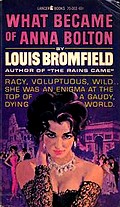
I picked up a copy of Louis Bromfield’s 1944 short novel, What Became of Anna Bolton? at one of my favorite bookstores, Magus Books, during a Christmas visit to the U. S.. Magus, located just a block from the University of Washington campus in Seattle, opened while I was going to school there 30-some years ago, and it’s one of an ever-diminishing number of bookstores where it’s still possible to find interesting old paperbacks from the 1960s and earlier.
I decided to take Anna Bolton along as my flight reading when we returned to Europe a few days later. From the title, I expected the story would be something about her disappearance or miraculous transformation. Taking the voice of David Sorrell, an American foreign correspondent, Bromfield introduces us to Anna Bolton at a London soiree in 1937. The widow of an American inventor and industrialist, she has come to London to work her way up the social ladder.
Sorrell, it turns out, knows Anna from their days growing up together in Lewisburg, Ohio. Anna–then Anna Scanlon–came from the wrong side of town, the daughter of a house cleaner and a town drunk. She falls in love with Tom Harrigan, from one of the better families in town. When Anna becomes pregnant, Tom elopes with her against his family’s wishes and they set up house in Pittsburgh. A year or so later, Tom dies in a car wreck and their baby follows soon after. It takes Bromfield about twelve pages to blitzkrieg through these first twenty years.

Sorrell next crosses paths with Anna some years later in the lobby of a pricey New York hotel, on the arm of Ezra Bolton, a fictional hybrid of Thomas Edison and Henry Ford. A year or so after hiring her as a secretary, Bolton marries her as a trophy wife (although the term hadn’t been invented yet). The marriage is an arid sham, but luckily for Anna, Bolton dies before it gets too tedious for her. Millions in hand, she takes off for Europe.
Hitler’s invasion of France puts a crimp in her plans for social ascent. Caught up in the tide of refugees from Paris, she catches the Joan d’Arc flu and adopts a village of the homeless and helpless as her cause:
The truth was that Anna had found something to do. She had great health and great energy and great ability as an executive, and now setting up a canteen gave her an outlet for all these qualities. She liked the trips to Lyons, to Orleans, to Paris, even as far as Marseilles and Geneva to buy soap and medicines, chocolate and cigarettes.
Clearly, Bromfield had not a clue about life in occupied France. At this point, the book was halfway over and nothing of interest had really happened. Yes, a number of events were related, but Bromfield hadn’t managed to make Anna Scanlon/Harrigan/Bolton much more than a cut-out doll. “I’ve seen you grow a soul,” Anna’s paid companion, Miss Goodwin, tells her after a few months of the humanitarian relief. Miss Goodwin’s eyes were sharper than mine. But for another six hours of flying, I would have given up.
In hindsight, I wish I had. Anna continues her black-market magic, manipulating an S.S. officer who’s convinced he’s in love with her. “I want to marry you,” he tells her, “because I am tired and sick and corrupt and you are strong and healthy and young.” No, I am not making that line up. She meets Jean Lambert, a handsome Russo-French officer who’s the spitting image of Tom Harrigan. After a bit of pallid “Taming of the Shrew” nonsense, they marry, then escape to Algiers to avoid imprisonment after the U. S. enters the war. Sorrell meets Anna again and finds her transformed. We have to take his word for it.
When I got back home, I did a little research and learned that Edmund Wilson gave What Became of Anna Bolton? a right bashing when it was first published.
Louis Bromfield used to be spoken of as one of the younger writers of promise. By the time he had brought out Twenty-four Hours, it was more or less generally said of him that he was definitely second-rate. Since then, by unremitting industry and a kind of stubborn integrity that seems to make it impossible for him to turn out his rubbish without thoroughly believing in it, he has gradually made his way into the fourth rank, where his place is now secure.
 Although he began by calling the book “one of his [Bromfield’s] most remarkable achievements,” after devoting about four times as much text to a recap of the novel’s plot with only an occasional dig, Wilson then dismissed it as, “a small masterpiece of pointlessness and banality.”
Although he began by calling the book “one of his [Bromfield’s] most remarkable achievements,” after devoting about four times as much text to a recap of the novel’s plot with only an occasional dig, Wilson then dismissed it as, “a small masterpiece of pointlessness and banality.”
To which I can only add, “Amen, brother!”
Despite the book’s utter lack of interest and distinction, What Became of Anna Bolton? managed to be reissued at least five times in paperback. Which just proves again how right Bo Diddley was when he sang, “You Can’t Judge a Book by Looking at the Cover.”

I was just at Magus a few days ago and you’re right…..one of the few places left to dig up some really interesting older titles. I love the place.
I picked up an old paperback copy of this book with a “sexy” cover, odd for a Bromfield book, I thought, but I loved The Rains Came and Mrs. Parkington was ok. Well, I’m glad to know I don’t have to figure out how to read that old pb without it falling apart! Thanks!